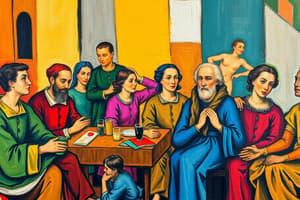Podcast
Questions and Answers
Which movement challenged the authority and doctrines of the Roman Catholic Church during the Renaissance?
Which movement challenged the authority and doctrines of the Roman Catholic Church during the Renaissance?
- The Protestant Reformation (correct)
- The Counter-Reformation
- The Enlightenment
- The Scientific Revolution
Who among the following Renaissance figures is associated with introducing new concepts of governance and statecraft?
Who among the following Renaissance figures is associated with introducing new concepts of governance and statecraft?
- Johannes Kepler
- William Gilbert
- Amerigo Vespucci
- Niccolò Machiavelli (correct)
Which city was home to the first stock exchange established in 1597 during the Renaissance?
Which city was home to the first stock exchange established in 1597 during the Renaissance?
- Florence
- Venice
- Genoa (correct)
- Rome
Which explorer traveled across the Atlantic Ocean during the Renaissance and discovered new continents and trade routes?
Which explorer traveled across the Atlantic Ocean during the Renaissance and discovered new continents and trade routes?
Which field experienced boundaries being pushed in anatomy during the Renaissance?
Which field experienced boundaries being pushed in anatomy during the Renaissance?
The Renaissance set the stage for which subsequent intellectual movement that emphasized human reason?
The Renaissance set the stage for which subsequent intellectual movement that emphasized human reason?
During which period did the Renaissance take place?
During which period did the Renaissance take place?
Where did the Renaissance originate?
Where did the Renaissance originate?
Which movement championed the study of ancient Greek and Roman texts during the Renaissance?
Which movement championed the study of ancient Greek and Roman texts during the Renaissance?
What impact did humanism have on Renaissance artists?
What impact did humanism have on Renaissance artists?
Which philosophical shift promoted individualism during the Renaissance?
Which philosophical shift promoted individualism during the Renaissance?
What field saw significant advancements during the Renaissance?
What field saw significant advancements during the Renaissance?
Flashcards are hidden until you start studying
Study Notes
The Renaissance: Flowering of Ideas, Art, and Knowledge
The Renaissance, which translates to "rebirth" in French, is a period that spanned from the late 14th century to the early 17th century in Europe. This epoch, often referred to as a golden age, was marked by a surge in intellectual, cultural, and artistic achievements that would profoundly shape Western civilization.
Origins
The Renaissance emerged in Italy, particularly in the cities of Florence and Siena, during the late Middle Ages. The period was characterized by a renewed interest in classical learning, humanism, and the natural world. Scholars such as Petrarch, Boccaccio, and Coluccio Salutati initiated the humanist movement, which championed the study of ancient Greek and Roman texts and sought to revive the cultural ideals of those periods.
Humanism and the Arts
Humanism fostered an intellectual climate that promoted individualism, civic virtue, and the dignity of human experience. This philosophical shift had a direct impact on the arts. Renaissance artists such as Leonardo da Vinci, Raphael, and Michelangelo embraced humanist ideals, crafting works that celebrated the human form and emphasized the importance of reason and rationality.
Science and Philosophy
The Renaissance also saw significant advancements in the sciences and philosophy. Nicolaus Copernicus, Johannes Kepler, and Galileo Galilei made important contributions to astronomy, while figures like William Gilbert and Andreas Vesalius pushed the boundaries of knowledge in the fields of magnetism and anatomy, respectively.
Politics and Economy
Political thinkers such as Niccolò Machiavelli and Thomas More introduced new concepts of governance and statecraft, while the rise of mercantilism and banking facilitated economic growth and international trade. In fact, the first stock exchange, the Banco di San Giorgio, was established in 1597 in Genoa.
Religion and the Reformation
The Renaissance also coincided with the Protestant Reformation, a movement that challenged the authority and doctrines of the Roman Catholic Church. Martin Luther, John Calvin, and other reformers sought to reform the church by emphasizing the importance of individual faith and scriptural authority.
Geographic Expansion
European powers also expanded their geographic reach during the Renaissance. Christopher Columbus, Amerigo Vespucci, and other explorers traveled across the Atlantic Ocean, discovering new continents and trade routes that would forever change the global economic landscape.
Legacy
The Renaissance set the stage for the Enlightenment and the Scientific Revolution, which furthered the pursuit of knowledge and demonstrated the power of human reason. Renaissance thinkers, artists, and philosophers are celebrated for their contributions to Western culture and the shaping of modern society.
In summary, the Renaissance marked a period of profound intellectual, artistic, and cultural growth in Europe. This epoch laid the foundation for many of the ideals and achievements that characterize Western civilization, and its impact continues to be felt to this day. The Renaissance, Encyclopædia Britannica, https://www.britannica.com/event/The-Renaissance The Renaissance, The Metropolitan Museum of Art, https://www.metmuseum.org/toah/hd/rena/hd_rena.htm The Renaissance, Khan Academy, https://www.khanacademy.org/humanities/art-history/renaissance/a-introduction-to-the-renaissance/a/the-renaissance-overview The Renaissance, History.com, https://www.history.com/topics/renaissance
Studying That Suits You
Use AI to generate personalized quizzes and flashcards to suit your learning preferences.




